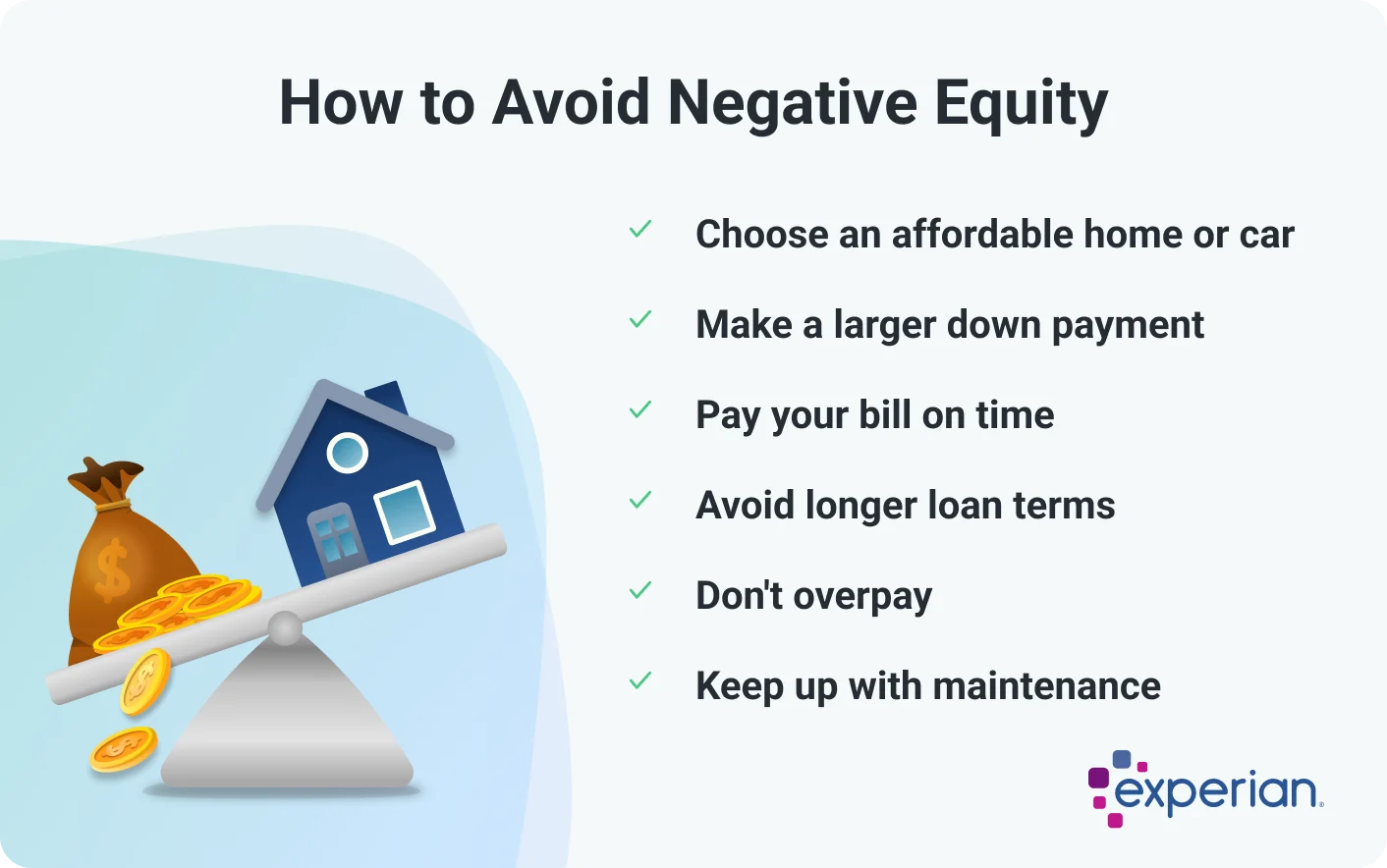What Is Negative Equity?
Quick Answer
Negative equity is when you owe more money on your car loan or mortgage than your vehicle or home is worth. You can get rid of negative equity by making additional payments, refinancing or waiting it out.

Having negative equity, also known as being underwater, is when you owe more on your mortgage or auto loan than your home is currently worth. Negative equity can be caused by factors that are out of your control, but that's not always the case.
If you have a car loan or mortgage, here's what to know about how negative equity works, how it impacts you and how you can get rid of or avoid it.
What Is Negative Equity?
With secured debt like an auto loan or mortgage loan, equity is the difference between your loan balance and the value of the property you're using as collateral.
If you have negative equity, it means that your car or home is worth less than your outstanding loan on the asset. Negative equity isn't always an issue, but it can be a major problem in certain cases (more on that later).
What Causes Negative Equity on a Mortgage?
Homes generally appreciate in value over time, but negative equity can occur in certain situations:
- Decline in property value: Home prices may decline due to various reasons, such as economic downturns, neglect and neighborhood deterioration.
- Overpaying for the property: The most you can typically borrow with a mortgage loan is 100% of a home's value. That means if you offer more than the property's appraised value, you'll likely need a large enough down payment to make up the difference. Even if you're able to get the loan approved, however, starting out with such a high loan-to-value ratio could increase your risk of negative equity.
- Falling behind on mortgage payments: Missing mortgage payments can result in extra interest and fees tacked onto your mortgage balance. The longer you wait to catch up, the higher your risk of becoming underwater on your loan.
Example: Say you buy a $400,000 home and take out a $400,000 mortgage loan to finance it. In the months after you move in, home demand goes down in the area and your home's value drops to $390,000. In this instance, you'll have roughly $10,000 in negative equity.
What Causes Negative Equity on an Auto Loan?
Unlike homes, vehicles tend to depreciate in value over time, particularly in the first few years. As a result, you may be more likely to be underwater on an auto loan than a mortgage loan.
Here are some factors that contribute to negative equity on an auto loan:
- Long loan term: The longer your repayment period, the more slowly you'll pay down your loan. If your vehicle depreciates at a faster rate than you can reduce your loan balance, you may end up with negative equity. If you have a lower credit score, you may be forced to opt for a longer term, so you can afford the higher monthly payment.
- Putting little or no money down: If you make a small down payment or none at all, you're more likely to have negative equity as the car depreciates. This is especially true for new cars, which lose value quickly in the first few years of use.
- Financing extra costs: Some auto lenders allow you to borrow up to 125% or more of your vehicle's sales price to account for taxes, fees and dealer add-ons. This means you'll be starting out with negative equity. By paying taxes and fees upfront and avoiding unnecessary dealer add-ons, you can minimize the possibility of being underwater on your loan.
Example: You buy a $30,000 car with no down payment and pay $3,000 in taxes and fees. Before you even drive off the lot, you have $3,000 in negative equity.
Learn more: How to Trade In a Car With an Upside-Down Loan
How Negative Equity Impacts You
Negative equity can be detrimental to your financial situation, especially if you want to sell your vehicle or home, or you need to file an insurance claim.
Auto Loan
It's possible to trade in a car while you're underwater on the loan. However, you'll need to decide whether to pay off the negative equity out of pocket or roll it into your new loan.
When you roll over the negative equity into a new loan, it increases the monthly payment on your new car loan—and can lead to even more negative equity.
Also, auto insurance companies typically only cover the current value of your vehicle and not the remaining balance on your loan. So, if your vehicle gets totaled in an accident, you might be stuck paying off the difference between your loan balance and your insurance payout on your own.
Mortgage Loan
Being underwater on your mortgage can create several challenges. For one, it may prevent you from refinancing to secure better loan terms, since lenders typically won't approve a loan for more than the property's current value.
Negative equity can also make it difficult to sell your home. Normally, the sale proceeds go toward paying off your mortgage. But if the sale price doesn't cover the full balance, you'd be responsible for paying the difference out of pocket.
In cases of financial hardship, your loan servicer may approve a short sale, though it can significantly impact your credit.
Learn more: Why Is Building Home Equity Important?
How to Get Rid of Negative Equity
There are several actions you can take to get rid of negative equity:
- Make additional payments. If possible, paying a little extra or making extra payments on your mortgage or car loan every month can help you get ahead.
- Refinance your loan. If your credit has improved, refinancing your auto loan could qualify you for a lower interest rate. This can save you money on interest charges and allow you to pay off your loan earlier. Refinancing a mortgage loan with negative equity will be challenging, but in extreme economic situations, some government programs may help.
- Sell the vehicle or home yourself. Sometimes, you can get more for your home or vehicle if you sell it yourself. You can also save on home sales commissions by not using a real estate agent. However, for-sale-by-owner transactions can come with their own set of obstacles and may lead to lower home sale proceeds.
- Make home improvements. Upgrading a kitchen or bathroom, adding on an extra room or new porch, replacing your roof or finishing your basement can improve the value of your home and possibly put more money in your pocket when you sell. Improvements do cost money, however, and it may make more sense to instead put the expenses toward paying down your loan.
- Wait it out. If your car still runs or you don't have to move anytime soon, you may want to sit tight and hope your car doesn't break down or the housing market improves.
How to Avoid Negative Equity
If possible, it's best to work to avoid negative equity so you don't have to worry about its financial impacts. Here are some steps you can take:
- Choose an affordable home or car. Staying within your budget can make it easier to avoid stretching yourself thin with financing. It'll also give you the financial bandwidth to make extra payments if you need to.
- Make a larger down payment. While it can take time to build up a significant down payment, especially for a home, your patience can pay off in helping you establish positive equity from the get-go.
- Pay on time. Paying your bills on time will not only help stave off negative equity, but it can also help you build and maintain a good credit score.
- Avoid longer loan terms. As previously mentioned, longer loan terms may come with lower monthly payments, but they build equity more slowly. A shorter term can help you pay down your principal faster, increasing your equity sooner.
- Avoid overpaying. When housing markets are competitive, it's easy to get caught up in bidding wars and pay more than a home is worth. Work with a qualified real estate agent to make informed offers backed by solid appraisal data.
- Keep up with maintenance. Whether it's your home or your car, make it a priority to invest in regular maintenance and necessary repairs to preserve or enhance your market value. Neglected upkeep can reduce resale value and leave you more vulnerable to negative equity.

Frequently Asked Questions
The Bottom Line
While negative equity can be a cause for concern, you can make it temporary by taking action now. By increasing your payments, refinancing your loan or finding ways to increase your asset's value, you can transition to positive equity. Once you're out from being underwater, maintain positive equity by limiting financial decisions that can hurt your equity status.
Throughout the process of handling your negative equity situation, make sure you continue to make payments on time in order to protect your credit. You can sign up for free credit monitoring through Experian to keep a close eye on your credit and make sure it stays in great shape.
Need a loan?
Whether you're shopping for a car or facing a last-minute expense, compare loan offers matched to your credit profile.
Start now for freeAbout the author
Ben Luthi has worked in financial planning, banking and auto finance, and writes about all aspects of money. His work has appeared in Time, Success, USA Today, Credit Karma, NerdWallet, Wirecutter and more.
Read more from Ben